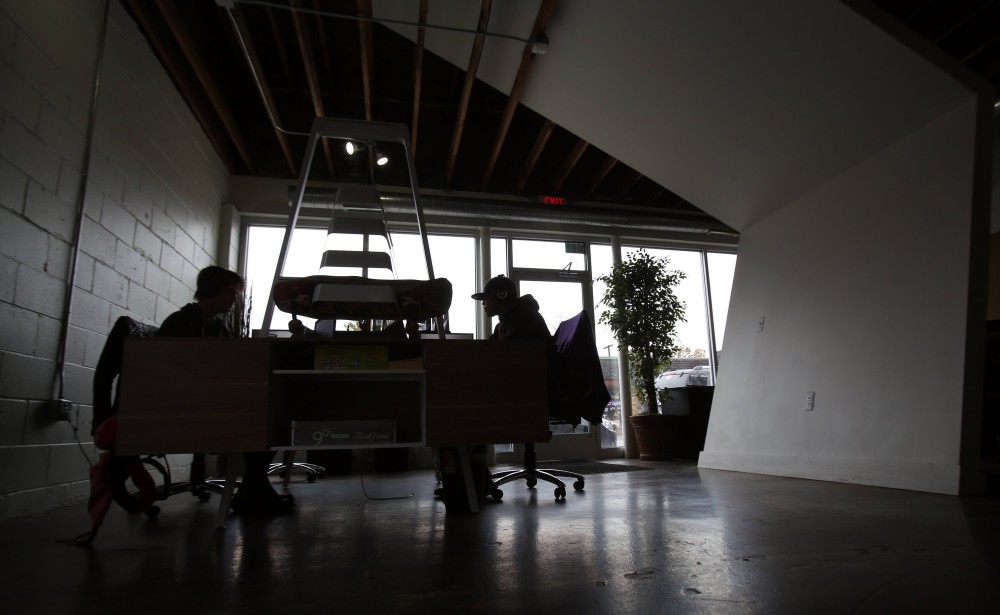By Shonda Novak
Austin American-Statesman
For Liz Elam, the big idea came in a crowded coffee shop.
While working out of her Atlanta home as a global account manager for Dell Inc., Elam found herself and a Dell executive strategizing about a multimillion deal in a distraction-filled coffee shop.
That frustrating experience, Elam said, made her realize that home-based telecommuters needed a better option — and that providing one could be a winning business formula.
Today, Elam — who left Dell in 2008 — is the founder and owner of two successful co-working spaces in North Austin — Link Coworking and Link Too — where entrepreneurs, consultants and others work separately at their respective endeavors, but under the same roof.
Co-working offers all of the benefits of being in an office, “without the politics,” said Elam, who has become a well-known advocate for the international co-working movement, writing about the topic for the Huffington Post and speaking at conferences around the world, including at South By Southwest Interactive.
Elam is at the vanguard of a rapidly growing business trend. An estimated 4,300 co-working spaces have sprung up around the world, and by 2020, 40 percent of the U.S. workforce is expected to be toiling remotely outside of a corporate nest, according to a report by Intuit Inc.
A survey by Deskmag, an online magazine that tracks the co-working industry, found that 60 percent of existing co-working offices are expected to acquire new space for their members this year.
The co-working wave has certainly hit in Austin, wherechoices come in “lots of flavors” , Elam said. Those co-working spaces often have a particular niche, like Capital Factory, which is tech-focused. Elam said her co-working spaces are suited for people in all types of industries.
“If you are a human and need a place to work, you’re welcome here,” Elam said.
Elam’s co-working spaces are Link Coworking, which has 3,000 square feet and opened in 2010, and Link Too, which has 3,500 square feet and opened in 2012.
Link Coworking is an open, fluid space with no assigned seating, and designed for solo professionals or small businesses with four or fewer employees.
The space also has five meeting rooms and a conference room available for rent to “Linksters,” as Link members are called.
As “Linksters” grow their businesses they can step up into more traditional space across a courtyard at Link Too, which has dedicated desk and office space.
About 100 Linksters work in the two venues.
There’s a $200-a-year membership fee, and members pay $300 per month if they sign a one-year contract at Link, and $400-a-month for a one-year lease at Link Too. Month-to-month options are $350 and $450 respectively.
Elam said the business is booming. Within the next few months, she plans to triple or quadruple the space she manages by opening two more locations.
Elam has zeroed in on a couple of potential spaces in Northwest Austin for a new location with up to 20,000 square feet of space, and she’s close to landing a South Austin location not far from Lady Bird Lake.
The Northwest location will be a hybrid concept that she hopes to open this fall. Called Link Flex, it would allow startups and businesses to take space on demand, scaling up or down as business conditions warrant, with flexible monthly lease options.
“It’s the next logical evolution of my business,” Elam said.
Elam said she has a waiting list of 70 people for a south location, and she has interest from five companies in the Link Flex space.
Elam’s “Linksters” say they are thriving in the co-working environment Elam has created.
“My clients come in and love it,” said Anica Joran, president of Austin Logo Designs, who worked from home for two years before signing on at Link.
“Working from home created a little bit of tension because at the end of the day, I’d want to go out with my family for dinner and escape my cabin fever, and they were ready to eat dinner at home and relax, understandably so,” Joran said. “You feed off of people’s energy here, especially since there are so many inspiring self-starters here.”
Ian VanHover, managing partner of Rocket Mobile, a mobile-app firm that until recently had 11 employees working at Link Too before finding new offices, said the experience “helped our team get stable and grow without the burden of managing our own space.”
Linkster Mark Cunningham, owner of a small information technology recruiting firm, says co-working helps him and others break out of the “singular isolation of working from home.”
“It separates home from work,” said Cunningham, who is married and has a daughter.”I wish I’d discovered it a lot earlier but at the time, I was thinking that telecommuting from home was the best thing out there. I think co-working is a step up from that.”
“Everyone here is either a small business owner, consultant or some type of entrepreneur and you simply feel these people at work and getting things done,” Cunningham said. “Everyone is very focused on their business and it creates a unique energy that is not often found in the corporate workplace, and never found at home.”














































































































































































































































































































































































